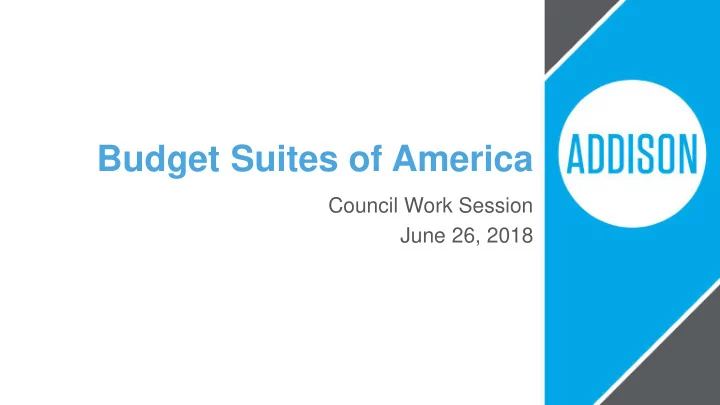

Budget Suites of America Council Work Session June 26, 2018
Previous Discussion ▪ Strategies to address aging hotels that do not meet community expectations ▪ Council discussed issue to identify and define the problem ▪ Revenue ▪ Zoning ▪ Code Enforcement ▪ Public Safety ▪ Staff proposed ordinance and administrative changes ▪ New Hotel Occupancy Tax Collection audit process ▪ New zoning requirements and development standards for hotels ▪ New hotel licensing and inspection process ▪ Council asked staff to determine if Town could focus on Budget Suites rather than implementing broad program 2
Overview ▪ Budget Suites or Suites of America ▪ 15130 Marsh Lane ▪ 6.55 acres ▪ Constructed in 1999 ▪ 6 Buildings ▪ 344 Rooms ▪ Owned by Bigelow Companies 3
Zoning History ▪ Property part of Planned Development O92-037 ▪ Hotel/motel not a permitted use ▪ Town’s general zoning ordinance says: “The uses permitted in any specific planned development district should be enumerated in the ordinance establishing such districts” ▪ In 1998, two zoning cases were processed rezoning this property ▪ O98-048 approved a Special Use Permit for a hotel/motel ▪ O98-049 approved a revised development plan for PD O92-037 to incorporate the hotel ▪ Approval process should have also amended the list of permitted uses of PD O92-037 to include hotel/motel 4
Tax Code Chapter 156: Hotel Occupancy Tax ▪ Sec. 156.051. Tax Imposed. ▪ Imposes a tax on a person who, under a lease, concession, permit, right of access, license, contract, or agreement, pays for the use or possession or for the right to the use or possession of a room or space in a hotel costing $15 or more each day ▪ Exceptions: ▪ Sec. 156.101. Exception – Permanent Resident. ▪ No tax on a person who has the right to use or possess a room in a hotel for at least 30 consecutive days, so long as there is no interruption of payment ▪ Sec. 156.102. Exception – Religious, Charitable, or Educational Organization. ▪ Sec. 156.103. Exception – State and Federal Government. 5
Hotel Occupancy Tax ▪ HOT Collections per Room per Hotel for Fiscal Year 2017 $2,500 Hotels $2,000 Extended $1,500 Stay Hotels $1,000 Budget Suites $500 $0 6
Hotel Occupancy Tax ▪ Collection Comparison for Fiscal Year 2017 (Oct 2016 – Sept 2017) $30,000 $25,000 $20,000 $15,000 $10,000 $5,000 $0 Budget Suites of America Monthly Average - All Hotels Monthly Average - Extended Stay Hotels 7
Hotel Occupancy Tax ▪ Financial audit completed by Finance Department in February 2018 ▪ Audit Period: January 1, 2015 – September 30, 2017 ▪ Audit found an additional $154.09 in HOT tax ▪ Only claimed the permanent residency exemption ▪ Over the audit period: ▪ 94.69% of actual gross receipts were non-taxable ▪ 5.31% of actual gross receipts were taxable ▪ Average for taxable receipts for all Addison hotels is approximately 85% ▪ Hotel Occupancy Tax data shows that Budget Suites is not operating similarly to Addison’s hotels, including extended stay concepts 8
Business Model ▪ Budget Suites does not advertise or operate as a hotel ▪ Promotes longer stays ▪ References rooms as “apartments” ▪ Uses words like “home” and “live” 9
Budget Suites Website
Budget Suites Website
Budget Suites Website
Budget Suites Facebook Account
Budget Suites Instagram Account
Signage in Lobby of Addison Location
Additional Information ▪ As part of financial audit, Budget Suites provided one tenant’s receipts showing continuous occupancy dating from January 2010-Febuary 2017 ▪ Department of Public Safety records show 450 Drivers Licenses with address of 15130 Marsh Lane ▪ 81 students permanently enrolled in Dallas Independent School District ▪ According to Budget Suites staff, USPS can deliver to residents 16
Possible Next Steps ▪ Rigorous Code Enforcement ▪ Would address potential code violations, but not the issue of use ▪ Revise ordinance to add length of stay limitations ▪ Would apply to all hotels ▪ Difficult to enforce except in extreme circumstances ▪ Staff determines that Budget Suites is not operating as a hotel, violating zoning ▪ Decision is appealable to the BZA ▪ Town could write citations, revoke CO, file Chapter 54 lawsuit ▪ Rezoning/Amortization Process ▪ Town could initiate rezoning to rescind SUP and start an amortization process requiring the business to cease operations after a certain period of time 17
Questions? 18
Recommend
More recommend